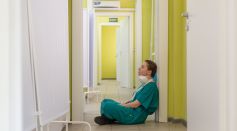Tags: Major depressive disorder

How Antidepressant Drugs Work and Why Others Don't Feel Relief
Deep Brain Stimulation Treatment For 5 Days Can Cure Depression? Here's What Stanford University Says

Past Psychological Trauma Exacerbates PTSD in Healthcare Workers During Pandemic, Oxford Researchers Say

Risk of Depression May Be Reduced by The Food We Eat; New Study Suggests Eating Mushrooms May Help Curb Symptoms

Depression During, After Pregnancy Could Impact The Child Later in Life, Longitudinal Study Reveals

Does Sleeping and Waking Up One Hour Earlier Help Get Rid of Depression? Here’s What Experts Say

Does Depression Play a Key Role in Low-Grade Systemic Inflammation? Study Says,
Most Popular

Will Earth's Magnetic Poles Flip Next? Magnetic Pole Reversal Explained Through Cutting‑Edge Magnetosphere Science

How Lightning Science Reveals Why Charged Storms Are Rising with Global Warming Effects

Relativity Time Dilation Explained: The Physics of Time and Why It Moves Differently in Space

Earthquake Magnitude vs Intensity: Key Differences Explained for Accurate Measurement





